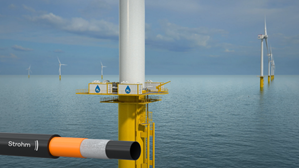News
Strohm successfully completes TCP H2 testing program
Strohm, a provider of thermoplastic composite pipes (TCP), confirmed the recent completion of an extensive H2 testing program on its TCP at Tüv-Süd in Germany. Carried out over the course of 6 mos the comprehensive permeation assessment covered a range of pressures and temperatures, using a full-scale TCP equipped with two end-fittings, with highly promising results.
Notably, both the TCP itself and the end-fittings exhibited exceptionally low H2 permeation values, underscoring the technical suitability of the product for high-pressure H2 service, a critical requirement in the evolving landscape of clean energy solutions.
Furthermore, the study shed light on the remarkable barrier properties of the TCP’s reinforcement layer. When compared to traditional unreinforced pipes, the TCP demonstrated a significant reduction in H2 permeation, approximately tenfold, thanks to this innovative design feature.
The results demonstrate Strohm’s TCP technology feasibility as a robust and reliable solution for offshore H2 infrastructure, offering corrosion resistance, superior fatigue life and a reduced environmental footprint.
Bart Steuten, Product Development Manager, Energy in Transition, Strohm said, “As the world transitions toward sustainable energy sources, TCP’s performance in H2 transport positions it as a key player in the energy transition journey. Not only does it ensure extremely low levels of permeation, especially when compared to conventional pipes, but it is also spoolable and simple to install, meaning it slashes the carbon intensity of projects. We would like to thank Tüv-Süd for their cooperation in this study, the results of which clearly demonstrate the benefits of TCP for use in H2 projects.”


